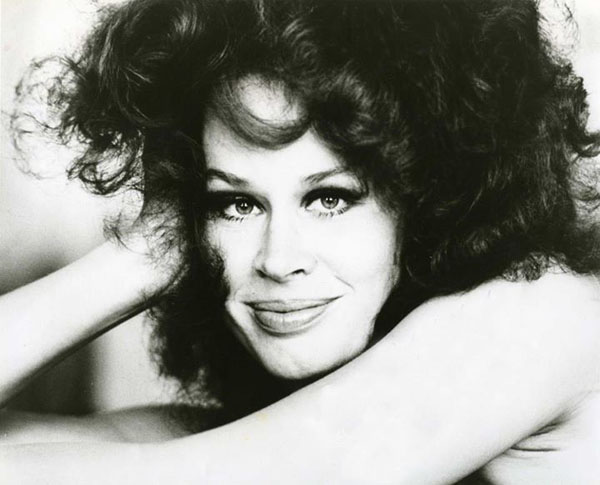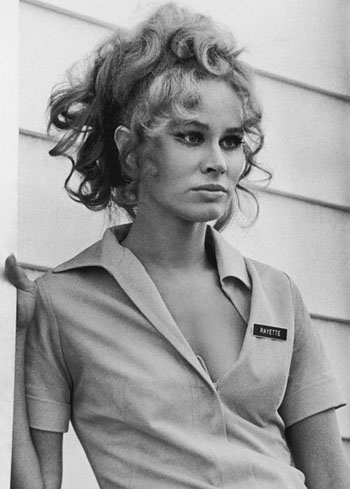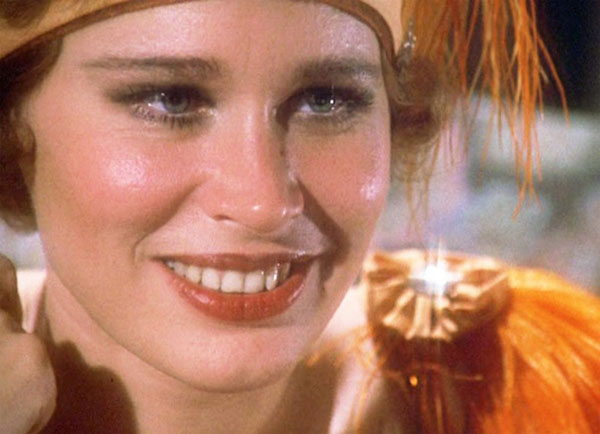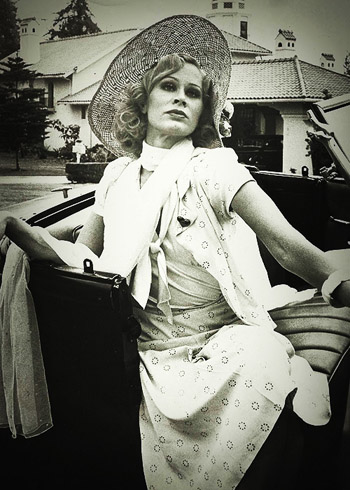“Karen Black, the prolific actress who appeared in more than 100 movies and was featured in such counterculture favorites as Easy Rider, Five Easy Pieces, and Nashville, has died,” reports the AP. “Black’s husband, Stephen Eckelberry, says the actress died Wednesday from complications from cancer. She was 74.”
“Black’s association with some of the era’s most original projects began with Easy Rider (1969), where she played a New Orleans prostitute who romps with bikers Dennis Hopper and Peter Fonda and new friend Jack Nicholson near the end of their cross-country trek,” writes Duane Byrge in the Hollywood Reporter. “She then earned an Academy Award nomination for best supporting actress for her portrayal of a kind-hearted, small-town waitress in Five Easy Pieces (1970), a part that Nicholson recommended her for. Black also won a Golden Globe and a New York Film Critics award for her rich portrayal of dimwitted waitress Rayette Dipesto.” Byrge also notes that Black composed the two songs she performed in Robert Altman’s Nashville (1975), “Memphis” and “Rolling Stone”: “She was nominated for a Grammy.”
“She often played women on the edge, actresses and hookers,” writes Variety‘s Pat Saperstein, “and though she had a memorable comeback in Altman’s Come Back to the Five and Dime Jimmy Dean, Jimmy Dean, she largely worked in dozens of B-movies after the early 1980s. Her first major film role came in Francis Ford Coppola’s 1966 You’re a Big Boy Now… Among her other roles were Nancy Pryor, the stewardess who is forced to fly the plane in 1974’s Airport 1975, as an actress in John Schlesinger’s The Day of the Locust, and as a kidnapper in Alfred Hitchcock’s last film Family Plot.”
Updates, 8/9: “Black was diagnosed with ampullary cancer in November 2010,” reports Matilda Battersby in the Independent. “The actress spoke publicly about her condition for the first time in March earlier this year when her husband launched an appeal to crowdfund her spiralling medical costs. Eckelberry turned to the money-raising website site GoFundMe to seek $32,000 to cover the costs of the actress’s treatment, which he called ‘her best and only shot.’ He wrote: ‘If you’ve ever enjoyed her work, now is your chance to reach back to Karen—because Karen needs your help.’ Fans of the actress responded in their hundreds, beating the target to raise $45,829 in under a week, and donating more than $60,000 in four months to fund treatment in Europe—which in the end Black was too ill to undergo.”
“Ms. Black began her career as a stage ingénue but was never really the ingénue on the screen,” writes Bruce Weber in the New York Times. “A rangy, imperfect beauty—her eyes were set ever so slightly off-kilter—she spent the better part of a decade as one of the movies’ most vivid character actresses. At a time when the women’s movement was surging, she rarely played the self-liberating woman—as did, say, Ellen Burstyn or Jill Clayburgh—but she was often a brassy, attention-grabbing presence in films whose main characters were men. In Drive, He Said (1971), Mr. Nicholson’s directorial debut, she played a faculty wife in an affair with a college athlete (William Tepper). In Portnoy’s Complaint (1972), based on Philip Roth’s dark comedy about the libidinous life a young Jewish lawyer (Richard Benjamin), she played his sexually voracious gentile girlfriend, known as the Monkey. In The Great Gatsby (1974), the generally dismissed version of Fitzgerald’s novel that starred Robert Redford, she was Myrtle Wilson, the crass, pathetic and doomed paramour of Tom Buchanan (Bruce Dern)…. ‘Black brings to all her roles a freewheeling combination of raunch and winsomeness,’ Time magazine wrote about her in 1975. ‘Sometimes she is kittenish. At other times she has an overripe quality that makes her look like the kind of woman who gets her name tattooed on sailors.'”
Joe Leydon: “Black also brought captivating shadings of intelligence and vulnerability to stock-issue ‘girlfriend’ roles opposite George Segal as a hairdresser turned junkie in Born to Win (a flawed but fascinating 1971 drama widely available in DVD editions that emphasize then-unknown co-star Robert DeNiro), and Kris Kristofferson (in his movie starring debut) as a down-on-his-luck musician exploited by a crooked narc (Gene Hackman) in 1972’s Cisco Pike…. Black remained active in movies and television long after the ‘70s, with credits ranging from neo-grindhouse horror movies (House of 1,000 Corpses) to quality series TV (Law & Order: Criminal Intent) to freewheeling indies (The Independent, in which [she] came off as a very good sport while playing a spoofy version of herself).”
At the AV Club, Sean O’Neal collects clips and adds: “The best brief summary of her film career, with all its ups and downs, may remain the name of the band that formed in 1990 and christened itself in her honor: The Voluptuous Horror of Karen Black.”
“In Altman’s Come Back to the Five and Dime, Jimmy Dean, Jimmy Dean (1982), Black plays Joanne, a transsexual who has come back to her hometown to deliver a secret to the fearsomely neurotic Mona (Sandy Dennis),” writes Dan Callahan at RogerEbert.com. “While Dennis is giving one of the greatest of all film performances in this picture, Black is right with her, letting her hair down, getting drunk, allowing us to see the fragility and the strength of this woman in equal measure. There are moments in Jimmy Dean where Dennis and Black reach the same level of intensity of the actresses in mid-period Ingmar Bergman films, and that’s a level of intensity and revelation seldom seen in American movies.”
In the Guardian, Ryan Gilbey focuses on Black’s “knack for conveying her characters’ rich and troubled inner lives, their cramped or thwarted dreams. The consummate example could be found in her Oscar-nominated performance as Rayette, the Tammy Wynette-loving girlfriend to Nicholson’s discontented antihero Bobby Dupea, in Five Easy Pieces. There was a comical but achingly sad intellectual gap between the two. Bobby resented her. Crucially, the audience never did. ‘I dig [Rayette], she’s not dumb, she’s just not into thinking,’ said Black in 1970. ‘I didn’t have to know anybody like her to play her. I mean, I’m like her, in ways. Rayette enjoys things as she sees them, she doesn’t have to add significances. She can just love the dog, love the cat. See? There are many things she does not know, but that’s cool; she doesn’t intrude on anybody else’s trip. And she’s going to survive.'”
“When I think back on favorite Karen Black films,” writes Jim Knipfel at the Chiseler, “it takes me a moment to get around to basics like Nashville, Five Easy Pieces, or even that amazing final shot (her idea, by the way) in Trilogy of Terror [1975]. The film that comes to mind first and foremost is a little nothing of a late ‘70s heist picture called The Squeeze. She plays a friendly stranger who removes a bullet from Lee Van Cleef’s stomach, then cares for him as he recuperates. There’s nothing terribly memorable about it, no tour de force turns, no accents or wigs or wild gestures. She was just Karen Black buying groceries for Lee Van Cleef, is all. I dunno, maybe that’s why it sticks with me.”
“Of all the great performers prominent in American cinema in the 1970s,” writes Glenn Kenny, “Karen Black embodied the most pleasing paradox: she had a screen presence so entirely particular that she never once seemed out of place in any role she played, any genre context.”
Nathaniel Rogers on The Great Gatsby: “Myrtle was a far more substantial role in the novel and in that particular film version than it happened to be in the latest Baz Luhrmann hit with Isla Fisher having the unenviable task of both following in Karen’s footsteps and having the bulk of the character dismissed. I’m not sure if this May interview posted at Karen Black’s website was her last official interview but in it, she discusses her process as an actor, an emotionally intuitive one rather than a technical trained one, and the character of Myrtle.”
“Her professional accomplishments span over five decades,” writes Rose Kuo, Executive Director of the Film Society of Lincoln Center, “but she will always remain in my mind, a woman with a wide smile and effervescent personality, talented and whip-smart, possessing abundant Midwestern frankness and loyalty, who challenged the world with her unconventionality but who remained until the end, a kind and generous soul.”
“She would never have made it in today’s clinical, surgical Hollywood—wouldn’t have made it in the 1950s either—and her success says a great deal about the guts, verve and imagination of the period in which her career began,” writes Gaby Wood in the Telegraph. “When the counterculture hit the screen, in other words, Black was its guiding female spirit.”
“To search for Karen Black clips on YouTube is to fall into a deliciously deep and twisty rabbit hole,” writes Slate‘s Dana Stevens, “so I’ll send you there to mourn her in your own way.” She posts “two moments that touched me.”
“She has three films scheduled for release in 2013,” notes Nathan Rabin at the Dissolve, “including a movie called Ooga Booga for B-movie maestro Charles Band that concerns a murderous action figure intent on revenge. It’s probably no coincidence that the film’s premise sounds suspiciously like the Zuni Fetish doll sequence in Trilogy of Terror, a parallelism that echoes the arc of Black’s career: cult greatness of the 1970s dimly reflected in the low-budget video-store fodder of later days. But thankfully, the great work Black did throughout her heyday will endure, even if the dimmer efforts littering the end of her filmography are destined to be forgotten.”
Update, 8/11: Aaron Cutler links to Ivan Passer’s Born to Win (1971) in which Black “tragicomically compels as a junkie’s girlfriend who feigns blind faith in him while knowing that she will always come second to speed. The movie was made during the prime of Black’s career, which is among the best demonstrations I know of how the celebrated boy’s club of New Hollywood filmmakers marginalized women.”
Update, 8/12: “Black’s distinctive beauty and spontaneous approach to acting gave her a broader range than suggested by the obits that used Rayette Dipesto as a touchstone for her career,” argues Susan Doll at Movie Morlocks. “I became a fan of Karen Black after I saw her in Trilogy of Terror, a made-for-TV omnibus of horror stories directed by Dan Curtis and written by Richard Matheson…. My favorite collaboration between Black and Curtis is Burnt Offerings, released theatrically in 1976.” Black’s is “a restrained performance compared to the showy roles that brought her critical acclaim–but one that is perfectly suited to the character.” For more, see Steve Senski at Trailers from Hell.
Update, 8/14: “Karen Black was the right actress for the wrong time, a distressingly real, jittery performer who expressed the pathos of being a woman with a larger-than-life personality in a series of movies that were mostly about the bleak romance of male angst and its inevitable causalities,” writes Paul Anthony Johnson at Cinespect. “The great ’70s cinema of the movie brat generation represented, among other things, a masculinization of American movies—a decisive shift away from the Bette Davis vehicles and Sirkian melodramas that had been the bread and butter of studio filmmaking during the classical era in favor of cinema largely about men and their desires and the consequences of their power. Great, charismatic, terrifically idiosyncratic actresses were too often reduced to taking the role of the dutiful wife, the girlfriend, the sexpot, etc. With her big, frizzy hair; big, bee-stung lips; and big, sad, slightly crossed eyes, Black fit the broken bombshell mold all too well, and her career path epitomized the limitations the era placed upon actresses.”
Update, 8/16: Writing for Sight & Sound, Peter Tonguette notes that in Five Easy Pieces, “after Rayette is slandered by a vile intellectual who makes a point with Rayette’s déclassé manner and unschooled turns of phrase, we start to see what William F. Buckley meant when he wrote that he would ‘sooner live in a society governed by the first two thousand names in the Boston telephone directory than in a society governed by the two thousand faculty members of Harvard University.’ Members of the latter group were probably more likely than members of the former to see and appreciate Five Easy Pieces when it was first released, but Black’s performance accomplishes the admirable function of making the former comprehensible to them. Before we are allowed to tire of Rayette, we start to care about her.”
For news and tips throughout the day every day, follow @KeyframeDaily on Twitter and/or the RSS feed. Get Keyframe Daily in your inbox by signing in at fandor.com/daily.







